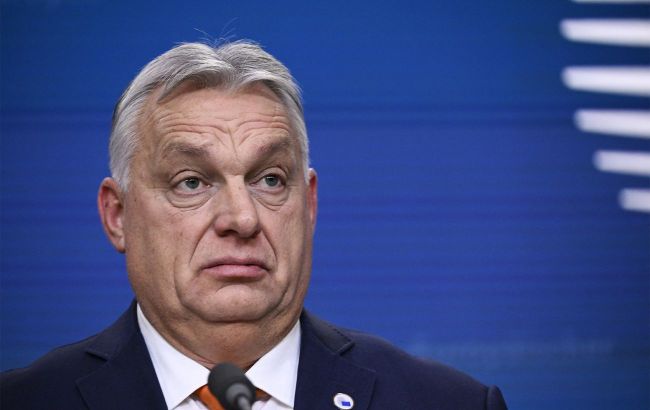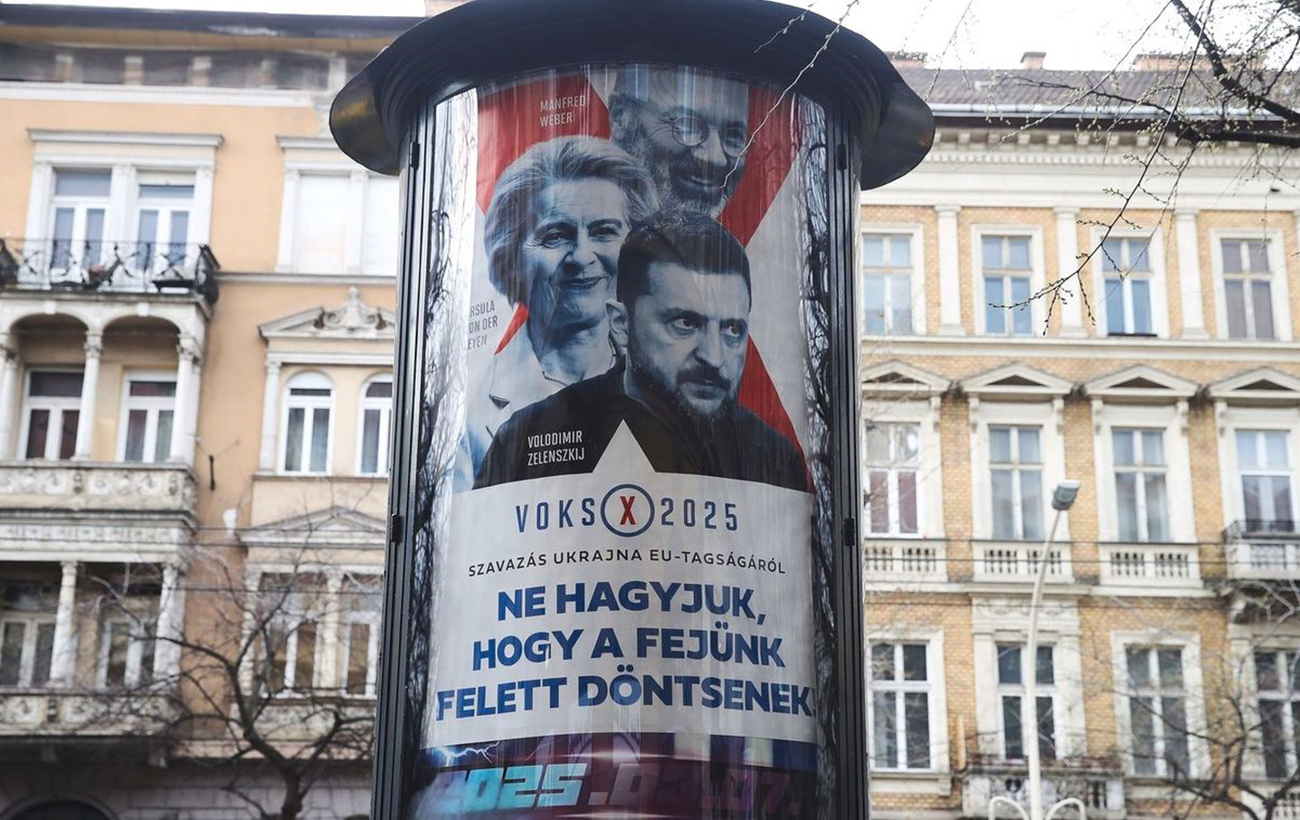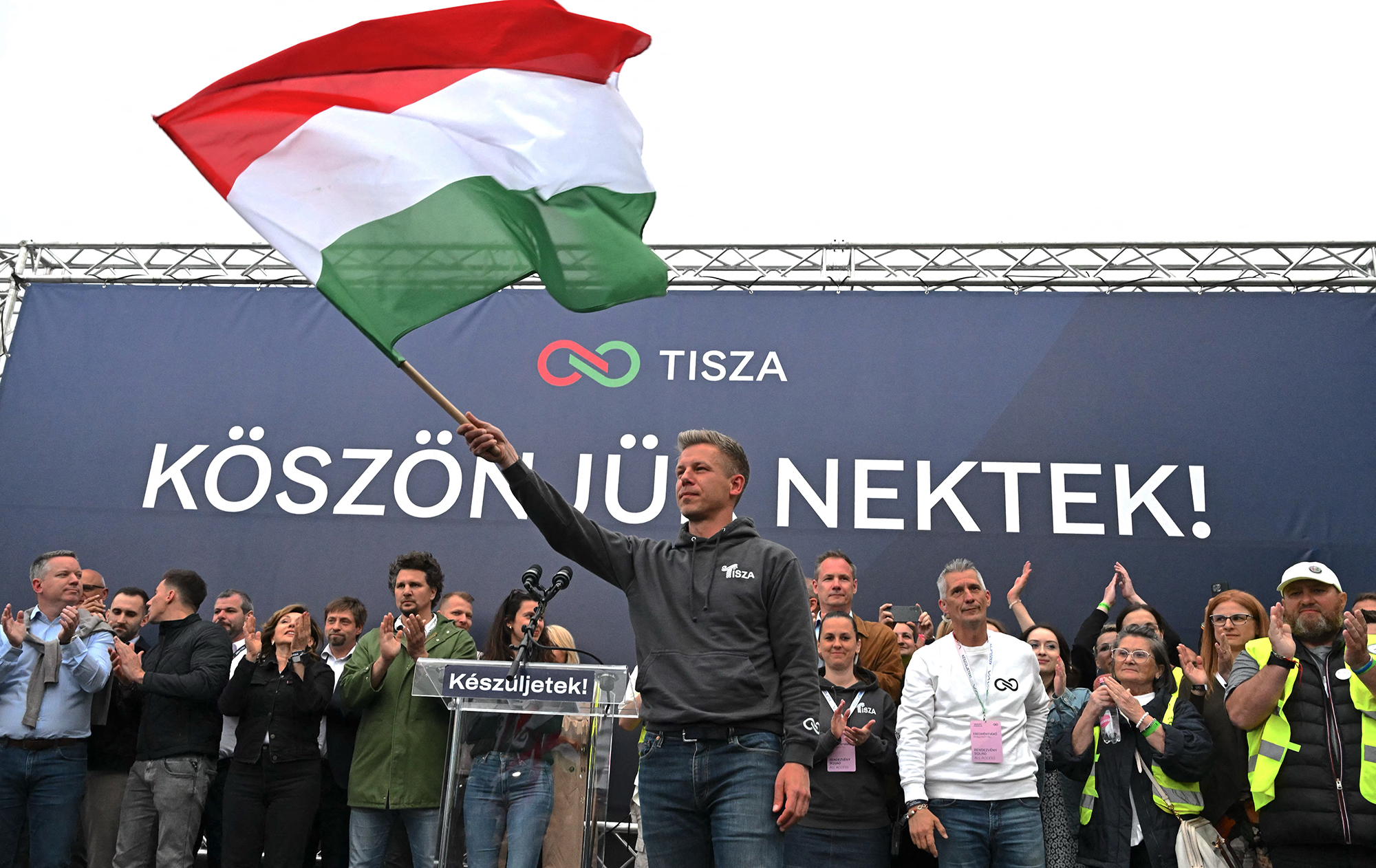Orbán turns on Ukraine again: Spy twists and consequences for Kyiv
 Viktor Orbán (photo: Getty Images)
Viktor Orbán (photo: Getty Images)
Hungarian Prime Minister Viktor Orbán has launched a large-scale anti-Ukrainian campaign. Will it help him stay in power, and what threats does this escalation pose for Ukraine? RBC-Ukraine explains in the article below.
Key questions:
- How is Orbán preparing for the elections, and why might he lose power next year?
- Why has the topic of Ukraine resurfaced in Hungarian politics?
- What risks does this escalation pose for Ukraine?
- Who can influence Orbán’s hardline position on Ukraine, and how?
Downtown Budapest, May 9. Fighters from Hungary's Counter-Terrorism Center blocked off one of the city’s streets to stop a vehicle. The operation lasted only a few minutes - officers surrounded a white Toyota RAV4 that had stopped at a checkpoint, pulled out Serhii Aleksandrov, handcuffed him, and pinned him face-down on the asphalt.
Aleksandrov is a former Ukrainian diplomat who previously served as first secretary at Ukraine's embassy in Hungary. He left diplomacy and opened two Ukrainian cuisine restaurants in Budapest. But that didn't stop the Hungarian authorities from accusing him of espionage and deporting him.
Earlier, Ukraine's Security Service reported uncovering a network of agents working for Hungarian military intelligence in the Zakarpattia region. In response, Hungary expelled two Ukrainian diplomats, and Ukraine in turn expelled two Hungarian ones.
Later, on May 20, the Hungarian authorities accused two more Ukrainian citizens of spying: István Holló, who had allegedly been living illegally in Hungary since the 1990s, and Zakarpattia regional council member Roland Tseber.
 The arrest of Serhii Aleksandrov (screenshot: RBC-Ukraine)
The arrest of Serhii Aleksandrov (screenshot: RBC-Ukraine)
Holló is currently in custody, while Tseber has been banned from entering Hungary since 2024 and is under Hungarian sanctions. In a comment to RBC-Ukraine, Tseber called the accusations absurd. Budapest claims he organized meetings with Hungarian political and military figures in order to "influence Budapest's position on Russia's war against Ukraine." The alleged reason? Tseber met with Hungarian opposition figure Péter Magyar when the latter visited Ukraine last year.
"Meeting and talking with various political figures - I've done that not only in Hungary but in different countries. I've been in their parliaments dozens of times, in the European Parliament too. This is their reaction to the recent arrest by Ukraine's Security Service of their agents in Zakarpattia," Tseber told RBC-Ukraine.
Zakarpattia regional council member noted that he does not want to interfere in Hungary's internal politics, but the Hungarian authorities are dragging him into it.
Another telling incident occurred on May 27. Hungarian Foreign Minister Péter Szijjártó claimed that Ukraine had allegedly banned the Transcarpathian Hungarian Cultural Association, which represents the interests of the Hungarian community. He was reacting to reports in Hungarian media that cited a little-known site called Zakarpattia News. That site, in turn, had posted a story referring to a TV appearance by the same Tseber. However, in the video, the Ukrainian politician never claimed the Hungarian party was banned, and, more importantly, he has no authority to make such decisions. Yet pro-government Hungarian media either couldn't or didn't bother to verify the source of this fake.
All of this is just the opening act of the performance titled External Threat, which Prime Minister Viktor Orbán is once again staging.
Why Orbán is always looking for external enemies
The reason for Orbán's latest escalation in rhetoric is clear. Parliamentary elections are scheduled to take place in Hungary in April next year. "The idea of an external enemy from whom Hungary needs to be protected, a job only Viktor Orbán is capable of doing, has been in the center of governing Fidesz-KDNP's (Orban's political bloc - ed.) political communication for several years. George Soros, migrants, Brussels, or Ukraine: the story is the same," said Zoltán Ranschburg, Senior analyst at the Republikon Institute in Budapest and former President of Amnesty International Hungary, in a comment to RBC-Ukraine.
Ukraine-Hungary relations have never been warm, mostly due to Budapest's manipulations surrounding the rights of the Hungarian minority in Zakarpattia. Since Russia's full-scale invasion, Orbán has taken an increasingly aggressive stance on Ukraine, repeatedly diverging from the EU's common position and openly siding with Russia. But this time things are going further than before.
"The logic of enemy-searching has always been a part of the Orbán project – and through raising the stakes, it has now culminated in the demonization of Ukraine. Not to mention the special relationship between Orbán and Putin," said Tibor Dessewffy, Director of the Digital Sociology Research Centre at Eötvös Loránd University in Budapest, in a comment to RBC-Ukraine.
According to Dessewffy, Orbán's political rhetoric is always aimed at polarization. His confrontational messages are meant to divide society and the electorate in a way that places Orbán in a more favorable political position. That's why the Hungarian leader constantly has to find divisive language and keep escalating the situation.
 Anti-Ukrainian poster (photo: Getty Images)
Anti-Ukrainian poster (photo: Getty Images)
Moreover, Orbán uses the notion of an external threat for more immediate benefits. Since March 2020, under various legal pretexts, Hungary has been continuously under a state of emergency. Initially declared due to the COVID-19 pandemic, it was later extended because of Russia's war against Ukraine - even though the war's impact on Hungary isn't always obvious. At the same time, the state of emergency limits the powers of parliament.
Zoltán Ranschburg highlights two more factors influencing the Hungarian Prime Minister's actions. First, the anti-Ukrainian rhetoric fits into the framework of Orbán's long-running conflict with the EU. The Hungarian government constantly challenges the European consensus on Ukraine. Within this logic, Ukraine and the EU end up "on the same side of the barricade" against Hungary. Second, Orbán reacts poorly to criticism and uses his propaganda machine to undermine trust in critics of the government.
"When President Zelenskyy started to openly criticize Orbán for his lack of support to Ukraine's efforts of protecting its independence from Putin's Russia, he immediately became a main target of Fidesz-affiliated propaganda," Ranschburg noted.
Aware of all these tendencies in the Hungarian government, Ukraine has grown used to taking Orbán's actions and statements with a philosophical attitude. In the past, Ukraine has found ways to circumvent Hungary's attempts to block its progress toward the EU and NATO. But this time much more is at stake - for both Ukraine and Hungary.
High stakes
For the first time in many years, Orbán's position within Hungary itself has noticeably shaken. Just last year, a new opposition leader burst onto the Hungarian political scene - Péter Magyar. His party, Tisza, steadily grew throughout the year and is now more popular than Orbán's Fidesz. According to a Publicus Center poll commissioned by the Nepszava portal, in mid-May, Magyar's party was supported by 30%, while Orban's political force had only 24%.
Overall, Orbán's core electorate can be estimated at about 1.8 to 2 million people, roughly a quarter of all eligible Hungarian voters. But increasing the number of his supporters is quite difficult for him, unlike for the opposition figure Péter Magyar.
"There is a kind of natural fatigue in the Hungarian voters, also in Fidesz voters. Also, Hungary is facing significant economic problems in the last five years. And whereas at the beginning Covid and the war in Ukraine could explain some economic hardships, it's no longer possible," Zsuzsanna Szelényi, Founding director of the Democracy Institute at Central European University, told RBC-Ukraine.
Several purely political factors also work in Magyar's favor. According to Szelényi, Magyar himself comes from within the Fidesz environment. He previously worked in government institutions and handled Hungary's relations with the European Parliament, and was also the husband of Hungary's Minister of Justice, Judit Varga. Magyar also stands out compared to other opposition figures who have challenged Orbán before.
 Péter Magyar at a rally (photo: Getty Images)
Péter Magyar at a rally (photo: Getty Images)
Magyar positions his party as centrist and opposes not only Fidesz but also the left-liberal opposition, which holds several seats in parliament. Moreover, the politician comments very cautiously on the topic of the Russia-Ukraine war. In turn, this limits the government's ability to criticize him as a "war supporter" in contrast to "peacemaker" Orbán.
"For example, if we see how his party's representatives are voting in the European Parliament, then we can see that in any questions which are related to the war or Ukraine or sanctions towards Russia, Tisza party members in the European Parliament don't say yes or no, they are abstaining," Szelényi emphasized.
That is why pro-government propaganda about Magyar has focused on economic issues. And this is where the greatest dangers for Ukraine lie.
According to Ranschburg, in response to Hungary's disappointing economic performance, Orbán's government began spreading the idea that there is a real chance Ukraine could join the European Union in the near future. And that this is exactly what Magyar would approve of if his party were in power. The second part of this thesis is that Ukraine's EU accession would immediately destroy the Hungarian economy.
"The economic situation - and, most importantly, its perception by the voters - is going to be a decisive factor in next year's elections, and Fidesz is doing everything in its power to shift the blame for the economy’s problems on the EU and on Ukraine," Ranschburg said.
In practice, it means blocking the euro-integration procedures. Early this year, Ukrainian officials announced an ambitious goal - to open all six so-called clusters, meaning to start practical negotiations on Ukraine's EU accession.
Decisions on this procedure are made unanimously, so Hungary must also support it. But Orbán launched national consultations on this matter, essentially voter surveys. However, the questions are formulated so manipulatively that a negative result for Ukraine is almost guaranteed. The decision on the clusters could have been made by the European Council at the summit on June 26–27. Orbán's consultations, however, end on June 20.
Even in this situation, Ukraine strives for maximum constructive dialogue and is willing to continue talks with Hungary. But whether European leaders will convince Orbán to "come out for coffee" again during the decision-making process regarding Ukraine, and what he might ask for in return, is impossible to predict.
Climax is still ahead
It is hard for the Hungarian experts interviewed by RBC-Ukraine to say how effective Orbán's rhetoric is. According to Zoltán Ranschburg, Orbán's messages currently seem less effective than during previous elections, in 2022. As Tibor Dessewffy noted, Orbán's party’s popularity is not necessarily falling right now, but Magyar is a serious competitor drawing his popularity from different sources.
"However, based on the experiences of recent years, we can hardly expect anything other than further radicalization in both foreign and domestic politics, and, of course, electoral handouts," the expert said.
For Ukraine, all this means new challenges and provocations from the Hungarian government. For the European Union, it means the necessity to find a way to neutralize Hungary's veto. But so far, there is not enough political will in Brussels and other capitals for decisive steps. For example, the EU has not yet gathered enough countries even to issue Hungary a warning for systemic violations of democratic values.
The situation is worsened by the fact that, amid the rise of right-wing radical parties in Europe, Orbán may gain new allies. In addition to Robert Fico in Slovakia, in Romania, far-right George Simion nearly became President. And this is definitely not the last such challenge for Europe.
"There is more and more influence from Russia within the European Union. And obviously, there are a lot of efforts placed into various elections in Europe in order that other parties, which are more pro-Russia, are reaching governing positions within the European Union," Zsuzsanna Szelényi told RBC-Ukraine.
However, in the longer term, there are positive hopes for Ukraine and the EU. First, the chances that Orbán will lose power next year remain high. However, neither Kyiv nor Brussels should base their policy towards Budapest on these hopes, because they may not come true.
Second, even now Orbán's room to maneuver is gradually shrinking due to his not-so-close relations with the new US President's administration as was expected during the US elections. For Donald Trump and much of his team, the strategic enemy number one remains China. Meanwhile, for Hungary, China is an important political and economic partner, and their ties are only strengthening. The need to balance between these global powers will be an additional challenge for Orbán.
Sources: data from a Publicus Center poll, statements from Hungarian and Ukrainian politicians, and comments by Roland Czeber, Tibor Dessewffy, Zoltán Ranschburg, and Zsuzsanna Szelényi.

